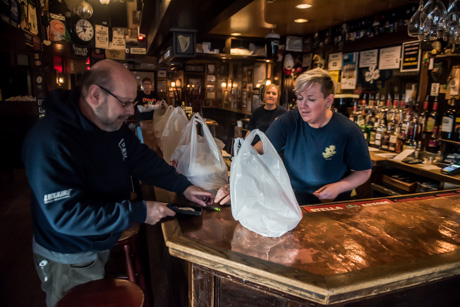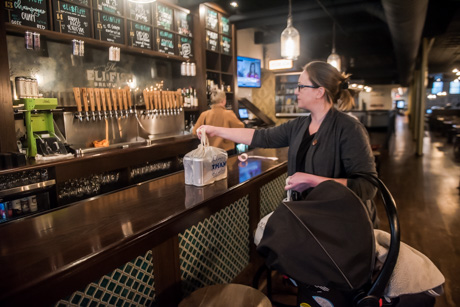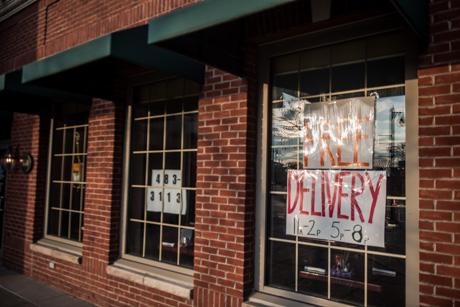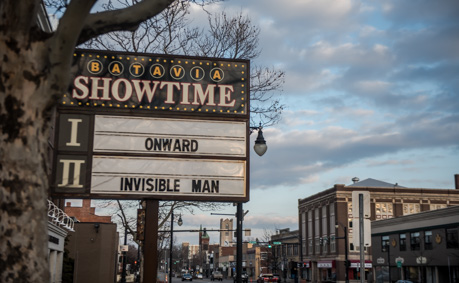Video Sponsor
.pane-node-body img {background: none !important; border: 0 !important; margin: 0 !important; padding: unset !important; padding-left: 1px !important }
broadstreet.zone(69076)
Genesee County Health Department personnel are investigating the circumstances that have resulted in an individual over the age of 65 becoming the first person to contract the COVID-19 virus in Genesee County.
“We’re just building the story,” said Paul A. Pettit, public health director for Genesee and Orleans County Health Departments said at today’s media briefing at the Old County Courthouse in Batavia. “Part of epidemiology, when we get these confirmed cases, is we have to go backwards. We have to try to identify those. We are literally making those calls as I'm speaking right now.”
Pettit said he couldn’t comment with “any validity” where the person may have been prior to becoming symptomatic and where they were at the moment, but his staff aims to find those answers.
“We will again be assessing and looking at where the story takes us because we have to investigate this and try to figure out and build those contacts,” he said. “Obviously, you've seen in other cases in surrounding counties, depending on unknown, if they were at an event, at a church service, at a faith-based event, or if they were at other another community event.”
Pettit said the infected person was in mandatory quarantine once he or she became symptomatic, and has remained there and has been “very compliant.”
“We’ve been checking on the person daily and now they are under mandatory isolation,” he added.
Previously, he had indicated that the person had not traveled -- which means he or she was infected by community transmission – and that the patient is isolated at home.
He said the person has been at home since being put in mandatory quarantine and “remains there and stable.”
“They are not under any severe respiratory distress, and fortunately in this case, there are other folks that live in the building (that has) separate living arrangements,” he said. “This individual has been again under quarantine and separated. So there has not been a contact that we're aware of. Again, we're still investigating a little more going backwards. But at the moment, again, there's no known contact with others in that dwelling at the moment.”
Pettit explained that his department is following the Center for Disease Control guidelines in New York State regarding clearance of a patient.
“Essentially it's a minimum of seven days following the positive test results and they have to actually have two clearance samples after seven days, 24 hours apart that are both negative,” he stated. “So, if you look at that from a time period, it's going to be a minimum of eight days. Again, that's assuming they test negative after that. Those initial tests are those initial swabs. They also have to be fever free without any type of fever-reducing medication.”
Beyond the one confirmed case, Pettit said there are 11 other Genesee County residents under precautionary quarantine and two others under mandatory quarantine. In Orleans County, he said there are no positive cases of the coronavirus, none under precautionary quarantine and five people under mandatory quarantine.
He emphasized that for accurate information, people should go to the Genesee or Orleans health department websites, which are updated each day at 5 o’clock.
“Rumors and things flying around and we just want to make sure we're transparent and we're providing you guys the most up-to-date current information that we can,” he said.
Pettit opened the session by talking about the importance of the public to do everything in its power to protect first responders.
“We only have so many of them right in our communities, and the last thing we want to do is have them removed from the response field,” he said. “It's very important that if you are calling, again, with a lifesaving emergency, we need to call 9-1-1. We need to respond to that incident. But if they're not life-saving situations, we need to make sure we're protecting our folks.”
He said if first responders get exposed to confirmed cases, they will be sidelined and a shortage of highly trained professionals will result.
Responding to questions from the media, Pettit said:
-- The two people under mandatory quarantine in Genesee County did not come into contact with the infected person, noting that “we're right now starting that contact tracing. So, at the moment, these are these are separate individuals.”
-- The health departments’ staff is holding up despite the hectic pace, “working very long days and doing their job and they’re happy to do their best to protect our residents and make sure that you have the most recent and up-to-date information.”
“We have great folks that are working for our counties, not just in the health department, but from all these departments and folks that represent you,” he said. “They work daily to protect and to provide services to our residents. You know, they're holding up. It's been busy. It's been busy this last couple of weeks, particularly when we started seeing cases here across New York state and now cases locally.”
-- The health department is not “swabbing,” but is performing mandatory daily checks if it’s a mandatory quarantine.
“We’re going out there once a day, verifying that they're being compliant with quarantine. We're also calling them once a day. When we do that, they're checking their temperature. We're asking if they have any type of respiratory symptoms. And, you know, that's how we're monitoring. If they report that they are symptomatic during that quarantine period, we would swab them to see if it is COVID-19. And then again, if they're positive from that point, they move over to mandatory isolation.”
-- He and his colleagues are frustrated over the inability to get their hands on some swab kits.
“We’re working with Tim (Yaeger) and Dale Banker (emergency management coordinators), putting in orders every day trying to get these and we're not alone,” he said. “If you look at all the other counties in Western New York, we are all screaming for these swabbing kits. And the guidance still is to go through your primary care provider. You've got to remember again, as we continue to talk about influenza, seasonal flu is still prevalent in our community. Just because you have respiratory illness does not mean you have COVID-19.”
-- He acknowledges the severe impact upon the business community, specifically restaurants, and that is why it is essential for people to separate to “flatten the curve” and shorten the impact of the virus.
“The main goal here is to get folks apart from one another, you know, so obviously restaurants, movie theaters, other places where people gather on a regular basis. Again, we have large groupings, you know, 30, 40, 100 people together. And again, what we know about disease transmission, again, airborne disease transmission, if we have folks together, if we have folks congregating, this virus can be passed easily.”
He said the virus can infect people within six feet of each other and it can stay alive and airborne for up to three hours.
“We need to flatten the curve. We need to push it out. We know we're going to see more cases. I mean, that's to be expected. Typically, under normal circumstances, when somebody is exposed, they're going to infect at least 2.2 additional people. So, with that in mind, the goal here is to get folks apart. So, we can lower that number, flatten the curve, push it out and free up our capacity and our health care system so we can again handle those folks over time.”
Genesee County Manager Jay Gsell noted that the county is following a directive from New York Gov. Andrew Cuomo concerning establishments, particularly restaurants and gathering places where meals are served.
“We are following the guidelines and the dictates,” he said. “We have not made up our own set of rules and regulations.”
In closing, Pettit said his staff and all agencies at the forefront of the pandemic are “doing our best” and ask for people to be as patient as possible.
“We understand the anxiety is there. We will have more information as soon as we can and maybe community swabbing locations or drive-thru swabbing sites,” he said. “We're currently developing those and putting them together. We'll have information on where those will be and when they'll be in the criteria.”
“The other thing I would ask is that people continue to be understanding and patient, that we need to really focus on those that are adversely impacted and that is our elderly -- and those with immune-compromised health issues. So, you know, if you're healthy and you're symptomatic and you're looking for the swab, we're going to try to accommodate you. But we need to again put our resources where we know they're being hardest impacted.”





